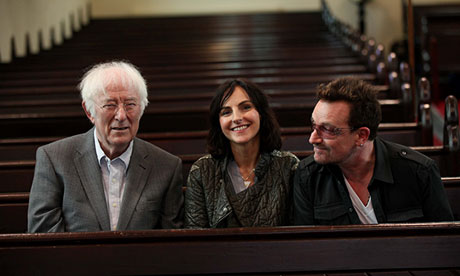The U2 frontman talks about the strength he draws from Seamus Heaney's poetry

Seamus Heaney in June 2012 at the Dalkey book festival with Bono and festival director Sian Smyth. Photograph by Conor McCabe
Every meeting I've ever had since I began full-time advocacy, I have brought with me a book of Seamus Heaney's poems. I always think if you're asking somebody for something it's a good idea to give them something first. So I always gave them Seamus Heaney's poems. This is from the pope to every president I have ever met. In this past week I gave Seamus's book Electric Light to President Johnson Sirleaf in Liberia. She's currently obsessed with the efforts to bring electricity to her people so she could not believe it.
Seamus has been with me on every journey I have taken, and there have been many times when a retreat into his words has kept me afloat. Most of our life in this kind of work is very concrete, full of facts, but we all have to seek redress from time to time in poetry. Seamus was where I went for that. He was the quietest storm that ever blew into town. As an activist, From the Republic of Conscience has been like a bible for me, something I return to and have returned to for as long as I can remember. Some of those phrases are like tattoos for me, worn very close to the heart.
Seamus has been with me on every journey I have taken, and there have been many times when a retreat into his words has kept me afloat. Most of our life in this kind of work is very concrete, full of facts, but we all have to seek redress from time to time in poetry. Seamus was where I went for that. He was the quietest storm that ever blew into town. As an activist, From the Republic of Conscience has been like a bible for me, something I return to and have returned to for as long as I can remember. Some of those phrases are like tattoos for me, worn very close to the heart.
1 comment:
“When Seamus Heaney, the Irish poet, was teaching English in the early 1960s at St Thomas’ Secondary School in the Ballymurphy area of Belfast, his headmaster, a Mr McLaverty, had a strong belief in the improving power of poetry. He would bustle into Heaney’s class and enquire whether he was doing any poetry with the boys and whether he was seeing any improvement in them as a result. Heaney would dutifully answer both questions in the affirmative. ‘Mr Heaney,’ McLaverty would continue, ‘when you look at the photograph of a rugby team in the newspaper, don’t you always know immediately from the look of the players’ faces which ones of them have studied poetry?’ Unfailingly, Heaney would reply that he did. In reality, Heaney tells us, many of the boys in his class ended up active members of Provisional IRA.”
-- What Good Are The Arts? John Carey (Faber and Faber).
Post a Comment